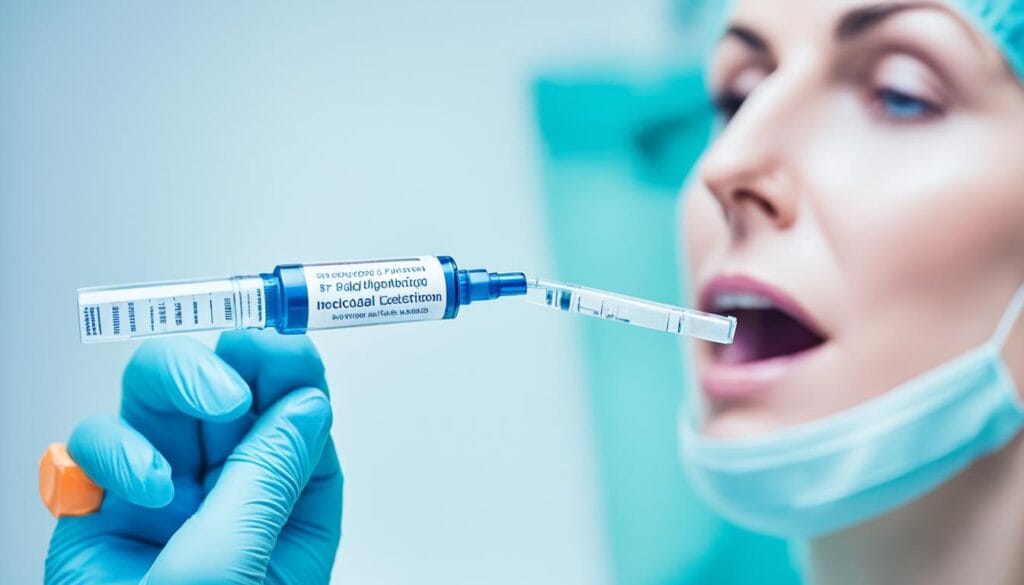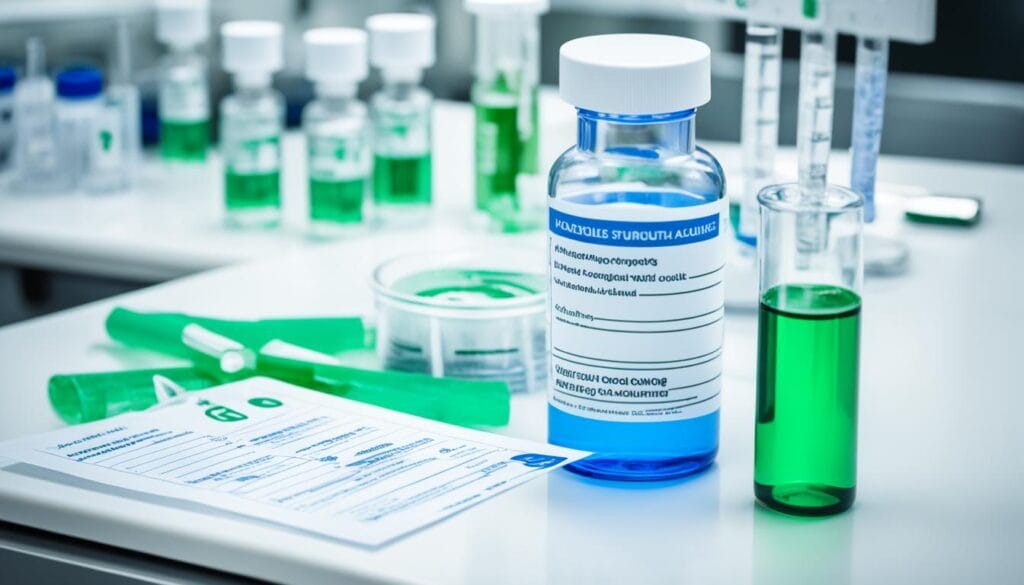
Many people are now looking into injectable treatments for weight loss. These include things like lipotropic, HCG, and vitamin B12 injections. But, there’s a lot of debate about how safe and effective they are.
This article will look into the safety and risks of these injections. We’ll give expert insights and deep analysis. We want to help you understand the different treatments and their science. This way, you can make smart choices about losing weight.
Key Takeaways
- Weight loss injections can include a variety of treatments, such as lipotropic injections, HCG injections, and vitamin B12 injections.
- The safety of these injectable treatments is a subject of ongoing debate, with potential risks including side effects, adverse reactions, and long-term health implications.
- Expert opinions and scientific evidence provide valuable insights into the safety and efficacy of weight loss injections, helping readers make informed decisions.
- Understanding the ingredients, potential benefits, and alternative options is crucial when considering weight loss injections.
- Choosing a reputable provider and following safety guidelines is essential for a safe and effective treatment experience.
Introduction to Weight Loss Injections
Weight loss injections are becoming more popular in the world of weight management. They offer a new way for people to lose weight and get the body they want.
Understanding the Growing Popularity of Injectable Treatments
Many factors have led to the rise in weight loss injections. They are seen as a convenient and private option for those who don’t like traditional weight loss methods. The ease of use and quick results have made these treatments more sought after.
Types of Weight Loss Injections Available
There are many types of weight loss injections available. Here are some of the most common ones:
- Lipotropic Injections: These injections help speed up fat metabolism and support natural weight loss processes.
- HCG Injections: HCG is a hormone used in weight loss programs, often with a low-calorie diet.
- Vitamin B12 Injections: Vitamin B12 boosts metabolism and energy, making it a favorite for weight management.
- Prescription Injectable Treatments: These include drugs like semaglutide and liraglutide, which help with weight loss under doctor’s care.
- Fat-Burning Injections: These injections aim to target and remove stubborn fat, but their effectiveness and safety are often questioned.
It’s crucial to research the weight loss injection risks, weight loss injection side effects, and safety of these injectable weight loss treatments before using them for weight loss.
are weight loss injections safe
Weight loss injections are getting more popular, but we need to look at their safety. Some people think they’re a fast way to lose weight. But, it’s important to know what science says and what experts think.
Potential Side Effects and Contraindications
Injections like those with hCG or lipotropic compounds can cause side effects. These include headaches, feeling tired, being irritable, and even serious problems like blood clots and thyroid issues. They might not be safe for people with heart disease, diabetes, or thyroid problems.
Also, we don’t fully understand the long-term effects of these injections. Experts warn that using them a lot could lead to hormonal problems or other bad outcomes.
Lack of Regulation and Quality Control
There’s a big worry about the safety of weight loss injections because they’re not well regulated. Many come from online or uncontrolled clinics. This makes it hard to know if they’re safe and work well.
Using these injections could lead to serious problems if they’re not given right or if they’re not clean. This shows why it’s key to talk to a doctor before trying them.
The safety of weight loss injections is a complex topic. Some people see good results, but there are risks and unknown long-term effects. It’s important to think carefully and get a doctor’s advice before starting.
Expert Insights on Safe Weight Loss Injections
Looking into weight loss injections? It’s crucial to get expert advice. Doctors and nutritionists highlight the need to know the risks and safety of these treatments.
“Working with a skilled healthcare provider is key,” says Dr. Sarah Johnson, a top weight management expert. “They can check what you need and keep an eye on your progress. It’s vital to stick to the right dosages and methods to avoid problems.”
“Having a doctor’s watchful eye is key when trying weight loss injections. Patients must know the good and bad before starting,” Nutritionist Emma Brown adds.
Experts urge patients to watch out for any signs of trouble or side effects. By teaming up with healthcare pros, you can safely and effectively explore weight loss injections.
| Expert Advice | Key Considerations |
|---|---|
| Seek professional guidance | Consult a qualified healthcare provider to assess your individual needs and monitor your progress |
| Adhere to recommended dosages | Follow the prescribed protocols to minimize potential risks and adverse effects |
| Be vigilant and report concerns | Communicate any symptoms or side effects promptly to your healthcare provider |
By focusing on safety and teaming up with medical pros, you can confidently explore safe weight loss injections. This way, you can reach your health and wellness goals.
Lipotropic Injections: A Closer Look
Lipotropic injections are getting more popular as people look for ways to lose weight. They aim to help with fat metabolism and managing weight. By understanding what’s in these injections and their benefits, people can make better choices for their weight loss.
Ingredients and Potential Benefits
Lipotropic injections mix nutrients and compounds to boost fat burning. They often include:
- Lipotropic compounds: Like choline, inositol, and methionine, which help manage fat metabolism and support the liver in processing fats.
- Vitamins and minerals: B-complex vitamins, vitamin C, and chromium are key for energy, nutrient use, and metabolic health.
- Amino acids: L-carnitine and L-arginine help move and use fatty acids for energy.
Lipotropic injections could help with weight loss in several ways, such as:
- Boosting fat metabolism and breakdown
- Increasing energy and reducing tiredness
- Improving liver function and detox
- Lowering inflammation and supporting health
It’s crucial to remember that how well and safely lipotropic injections work can differ. Always talk to a healthcare expert before starting any new weight loss plan.

“Lipotropic injections can be a valuable tool for individuals looking to boost their weight loss efforts, but they should be used under the guidance of a qualified healthcare provider.”
HCG Injections for Weight Loss
HCG injections are a debated weight loss method that use the human chorionic gonadotropin (hcg) hormone. Some say they help with quick and big weight loss. But, many experts question their safety and effectiveness.
People think hcg injections work by moving fat, reducing hunger, and boosting metabolism. Yet, many doctors worry about the risks and the lack of solid proof of their benefits.
- Potential Benefits of hcg Injections for Weight Loss:
- Rapid weight loss, up to 1-2 pounds per day
- Suppressed appetite and reduced food cravings
- Increased energy and metabolism
- Potential Risks and Concerns:
- Potential side effects, such as headaches, fatigue, and irritability
- Lack of long-term safety data and potential health risks
- Legality and regulation issues in some regions
Some people say hcg injections helped them lose weight, but the science is not clear. Always talk to a doctor before trying any weight loss method. This ensures it’s safe and right for you.
“The use of hcg for weight loss is highly controversial and not supported by robust scientific evidence. Patients should be wary of claims of rapid, effortless weight loss and consult their healthcare provider before pursuing this or any other injectable weight loss treatment.”
Vitamin B12 Injections: Boosting Metabolism
Many people are looking into vitamin B12 for weight loss. This vitamin is key for our body’s metabolic processes. Some believe that vitamin b12 injections for weight loss can boost metabolism and help lose weight.
Understanding the Role of B12 in Weight Management
Vitamin B12 helps turn food into energy, which is called metabolism. It helps turn fats, proteins, and carbs into energy. Vitamin b12 injections for weight loss might help people lose weight by supporting this process. It also helps make red blood cells, which carry oxygen, boosting energy levels.
But, the link between vitamin b12 injections for weight loss and losing weight is complex. Vitamin B12 is important for metabolism, but its effect on weight loss is still being studied.
| Potential Benefits of Vitamin B12 Injections | Potential Risks of Vitamin B12 Injections |
|---|---|
|
|
Before trying vitamin b12 injections for weight loss, talk to a healthcare professional. They can explain the benefits and risks. They can also see if it’s right for your health goals and needs.

Weight Loss Medication Injections
The weight loss industry is growing, and new treatments like injectable medications are becoming popular. These treatments aim to help people manage their weight by targeting specific body processes. They offer a unique way to lose weight.
Exploring Prescription Injectable Treatments
Wegovy™ and Ozempic® are leading injectable weight loss treatments. They use semaglutide, which is similar to a hormone that helps control hunger and sugar levels in the body. This hormone, called glucagon-like peptide-1 (GLP-1), is key in managing weight.
These injections are given once a week. They make you feel full, reduce hunger, and help your body use insulin better. Studies show they work well when used with a healthy lifestyle. Many people lose a lot of weight with these treatments.
| Injectable Weight Loss Treatment | Active Ingredient | Mechanism of Action |
|---|---|---|
| Wegovy™ | Semaglutide | GLP-1 receptor agonist, regulates appetite and metabolism |
| Ozempic® | Semaglutide | GLP-1 receptor agonist, improves blood sugar control and weight loss |
These treatments look promising, but it’s important to know the risks. Always talk to a doctor before starting. Following their advice and taking the medication as directed is key to getting good results.
Fat-Burning Injections: Separating Fact from Fiction
“Fat-burning injections” have become popular in the weight loss world. They’re seen as a quick way to lose weight. But, it’s important to look at the facts and science behind them.
Some treatments like lipotropic injections or hormone therapies can help when used correctly. But, the idea of “fat-burning injections” is often overhyped. These treatments promise fast and easy weight loss, but it’s not always true.
One big worry is that these injections aren’t proven to be safe or effective long-term. They often have many substances that we don’t fully understand. Using them without care can cause bad reactions, nutrient problems, and even serious health issues.
If you’re thinking about injectable weight loss treatments, talk to a healthcare expert. They can tell you about the risks and benefits. They can also suggest safer, proven ways to manage weight that focus on your health and lasting results.
The idea of “fat-burning injections” might seem too good to be true. While some treatments can help with weight loss under a doctor’s watch, be careful. Always think about your health first, not just quick fixes.
“The most effective and sustainable weight loss strategies focus on lifestyle changes, balanced nutrition, and regular physical activity, not quick-fix injections or pills.”
| Fact | Fiction |
|---|---|
| Some injectable treatments, like lipotropic injections, can support weight loss when prescribed by healthcare professionals. | Fat-burning injections are a miracle solution that can melt away fat with little to no effort. |
| Proper medical supervision is crucial when considering any injectable weight loss treatments. | Fat-burning injections are safe and effective for anyone to use without consulting a healthcare provider. |
| Sustainable weight management involves a holistic approach of healthy eating, regular exercise, and lifestyle modifications. | Fat-burning injections can replace the need for a healthy lifestyle and lead to rapid, long-term weight loss. |
Injectable Weight Loss Treatments: Pros and Cons
Injectable weight loss treatments are gaining attention, sparking both hope and debate. They promise quick weight loss and a faster metabolism. But, they also have risks and things to consider. Let’s look at the good and bad sides of these treatments.
Potential Benefits
- Faster weight loss: Some treatments, like HCG injections, can lead to quick weight loss, especially at first.
- Boosted metabolism: Injections with vitamin B12 might increase your metabolism, helping with weight control.
- Targeted fat reduction: Lipotropic injections aim to remove stubborn fat, offering a focused way to lose weight.
Potential Drawbacks
- Side effects: These treatments can have side effects, like nausea, dizziness, and serious issues, based on the medication.
- Ongoing treatment: Many require regular shots to keep working, which can be hard and expensive.
- Lack of regulation: The market isn’t well-regulated, making it hard to know if products are safe and quality.
When thinking about injectable weight loss treatments, weigh the good against the bad. It’s key to talk to a healthcare expert to find a safe and right option for you.
“The decision to try injectable weight loss treatments should be careful. Make sure to research well, know the risks, and work with a healthcare provider for a safe and effective path.”
Choosing a Reputable Provider
When looking into safe weight loss injections, picking a skilled and trusted healthcare provider is key. It’s vital to choose a professional who knows their stuff and has a good reputation. This ensures you get a safe and effective treatment.
Start by checking the provider’s qualifications and experience. Make sure they are a licensed doctor, nurse practitioner, or specialist in weight management. They should have a history of success with injectable treatments. Also, ask about their training and education in using weight loss injections safely.
- Ensure the provider is licensed and accredited in their field
- Ask about their experience with weight loss injections and the number of patients they have treated
- Verify that they follow strict safety protocols and use only high-quality, FDA-approved products
- Consider reviews and recommendations from their current or past patients
A good provider will always put your health first. They will take the time to understand your medical history and talk about your goals. They should be open about the risks and side effects of weight loss injections. Plus, they will support and check on you throughout your treatment.
| Provider Qualification | Importance |
|---|---|
| Medical Credentials | Ensures the provider is licensed and qualified to administer weight loss injections safely |
| Experience with Injectables | Demonstrates the provider’s expertise and ability to deliver effective and personalized treatment |
| Adherence to Safety Protocols | Prioritizes patient safety and minimizes the risk of complications or adverse effects |
| Patient Satisfaction | Reflects the provider’s commitment to delivering high-quality care and positive outcomes |
By picking a skilled weight loss injection provider, you’re taking a big step towards your goals. You’re also keeping your health and safety in mind. With the right expert by your side, you can confidently explore the world of safe weight loss injections.

Safety Guidelines for Weight Loss Injections
When it comes to weight loss injections, safety is key. It’s vital to follow guidelines set by healthcare pros. These rules help lower risks and make sure you get the benefits without too many side effects.
Ensuring a Safe and Effective Treatment Experience
To stay safe with weight loss injections, keep these tips in mind:
- Consult with a licensed healthcare provider: Talk to a qualified doctor or nurse before starting weight loss injections. They’ll check your health history and see if the treatment is right for you. They’ll also give you advice tailored to you.
- Follow the prescribed dosage and administration instructions: Stick to the dosage and how to use it as your doctor says. Don’t change it or give it to yourself without their okay.
- Monitor for side effects: Watch out for any bad reactions or side effects like pain, swelling, or odd symptoms. Tell your doctor right away if you notice anything.
- Maintain regular follow-up appointments: Meeting with your doctor regularly is key to making sure your treatment is working safely and well.
- Disclose all medications and supplements: Tell your doctor about any other meds, vitamins, or supplements you’re taking. They could interact with the injections and affect your safety.
By sticking to these safety tips, you can lower the risks of weight loss injections. This makes your treatment more likely to be safe and successful.
Alternatives to Weight Loss Injections
Weight loss injections might seem appealing, but there are safer and more effective ways to lose weight. These methods focus on changing your lifestyle, eating habits, and exercise routines. They help you reach your weight loss goals without the risks of injections.
Lifestyle Changes
Changing your lifestyle is a key to losing weight. Here’s how:
- Make exercise a part of your daily life with cardio and strength training.
- Eat a diet rich in whole foods and avoid processed ones.
- Ensure you get enough sleep and manage stress to help with weight control.
Dietary Modifications
Changing how you eat can also help with weight loss. Try these tips:
- Eat more high-protein, low-calorie foods to stay full and build muscle.
- Choose foods high in fiber to feel satisfied and eat less.
- Cut down on added sugars, refined carbs, and unhealthy fats.
Non-Invasive Treatments
There are also non-invasive treatments that can help with weight loss. These include:
- Cryotherapy – Freezing fat to boost metabolism and burn calories.
- Infrared therapy – Uses infrared light to target and melt fat cells.
- Ultrasound therapy – High-frequency sound waves to break down and remove fat.
These safe weight loss injections and alternatives offer a holistic way to manage weight. They address the underlying causes of weight gain and are safer than injections.
Conclusion
Exploring weight loss injections shows they need careful thought and expert advice. Some injections, like lipotropic and B12 shots, might help with metabolism and fat loss. But, the safety and effectiveness of many weight loss injections are still being studied and debated.
Experts stress the need to know the risks and limits of these treatments. People looking to lose weight should talk to their doctors. They need to consider their health history and if the injections are right for them.
Choosing weight loss injections should be part of a bigger plan. This plan should include healthy eating, regular exercise, and other proven methods. By being well-informed and focusing on safety, people can make smart choices for their health and happiness.
FAQ
Are weight loss injections safe?
The safety of weight loss injections depends on the treatment type. Some, like lipotropic and vitamin B12 injections, are generally safe when given by a qualified doctor. But, others, such as HCG injections, have safety concerns and little scientific proof of their weight loss benefits. Always research the risks and benefits before trying any weight loss injection.
What are the potential risks and side effects of weight loss injections?
Weight loss injections can cause injection site issues like pain or infection. They can also lead to hormonal imbalances, nutrient shortages, and in rare cases, serious problems like gallbladder issues or blood clots. The risks depend on the injection type and your health history.
Are there any safe weight loss injections?
Some weight loss injections, like lipotropic and vitamin B12, are considered safe under a doctor’s care. But, safety can vary. Always talk to a healthcare provider to find the safest and best weight loss option for you.
What are lipotropic injections, and are they safe for weight loss?
Lipotropic injections mix nutrients and compounds to help with fat metabolism and weight loss. They’re seen as a safer choice than some other injections. But, their effectiveness for weight loss is still being researched and debated.
Are HCG injections for weight loss safe?
HCG injections for weight loss are controversial. Many experts doubt their scientific backing, and there are worries about side effects like hormonal imbalances and blood clots. It’s best to avoid HCG injections for weight loss due to the lack of solid evidence and health risks.
Can vitamin B12 injections help with weight loss?
Vitamin B12 is important for metabolism and energy. Some think B12 injections can aid in weight loss. But, there’s limited proof they directly help with weight loss. B12 injections are safe for most people but shouldn’t be the only way to lose weight.
What are prescription injectable treatments for weight loss?
Prescription injectable weight loss treatments are new and growing. They include Saxenda (liraglutide) and Wegovy (semaglutide), approved by the FDA. These work on appetite and metabolism. While they might be better than some other options, they still have risks and side effects to consider.
What are “fat-burning injections,” and are they safe?
“Fat-burning injections” are marketed as quick weight loss solutions. But, there’s little science backing their safety and effectiveness. Many are not regulated well, and their long-term effects are unknown. Be cautious of any injection promising quick fat loss, as it might not be safe or work well.

